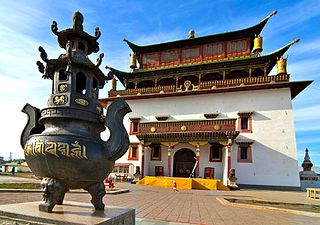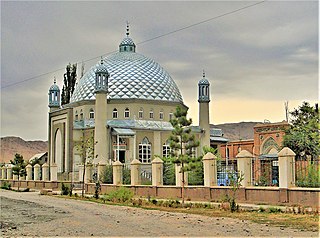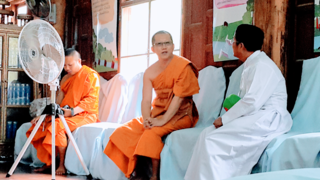Freedom of religion in Sri Lanka is a protected right under Chapter II, Article 9 of the constitution of Sri Lanka. This applies to all religions, though Buddhism is given the foremost place under the 1978 Republican Constitution. Sri Lanka is regarded by its Supreme Court as being a secular state.

Buddhism is the largest religion in Mongolia practiced by 51.7% of Mongolia's population, according to the 2020 Mongolia census. Buddhism in Mongolia derives much of its recent characteristics from Tibetan Buddhism of the Gelug and Kagyu lineages, but is distinct and presents its own unique characteristics.

Hinduism in Mongolia is a minority religion; it has few followers and only began to appear in Mongolia in the late twentieth century. According to the 2010 and 2011 Mongolian census, the majority of people that identify as religious follow Buddhism (86%), Shamanism (4.7), Islam (4.9%) or Christianity (3.5). Only 0.5% of the population follow other religions.

Religion in Mongolia has been traditionally dominated by the schools of Mongolian Buddhism and by Mongolian shamanism, the ethnic religion of the Mongols. Historically, through their Mongol Empire the Mongols were exposed to the influences of Christianity and Islam, although these religions never came to dominate. During the communist period of the Mongolian People's Republic (1924–1992) all religions were suppressed, but with the transition to the parliamentary republic in the 1990s there has been a general revival of faiths.
According to various polls, the majority of Kazakhstan's citizens, primarily ethnic Kazakhs, identify as Sunni Muslims. In 2020, Shia Muslims made up 0.55% of the population.
The Constitution provides for freedom of religion, but the government imposes onerous criteria on religious groups for official recognition, which is required for the legal construction of houses of worship. There is no registered muslim groups in Angola.
The Bhutanese Constitution of 2008 and previous law provide for freedom of religion in Bhutan; however, the government has limited non-Buddhist missionary activity, barring non-Buddhist missionaries from entering the country, limiting construction of non-Buddhist religious buildings, and restricting the celebration of some non-Buddhist religious festivals.

Islam is the main religion in Kyrgyzstan and the constitution guarantees freedom of religion.
Nepal is a secular state under the Constitution of Nepal 2015, where "secular" means religious, cultural freedoms, including protection of religion and culture handed down from time immemorial.
The Constitution provides for freedom of religion and for the principle of separation of church and state; however, the Government continued to restrict these rights in practice. The Government permits the operation of what it considers mainstream religious groups, including approved Muslim groups, Jewish groups, the Russian Orthodox Church, and various other Christian denominations, such as Roman Catholics, Lutherans, and Baptists. Uzbek society generally tolerates Christian churches as long as they do not attempt to win converts among ethnic Uzbeks; the law prohibits or severely restricts activities such as proselytizing, importing and disseminating religious literature, and offering private religious instruction.
Myanmar has been under the rule of repressive authoritarian military regimes since 1962. After the 1974 Socialist constitution was suspended in 1988, constitutional protection of religious freedom has not existed, after the bloody suppression of the 8888 Uprising. The authorities generally permitted most adherents of registered religious groups to worship as they choose; however, the government imposed restrictions on certain religious activities and is accused of abusing the right to freedom of religion.

The Constitution provides for freedom of religion, and the government has generally respected this right in practice. Buddhism is the state religion.
Freedom of religion in Taiwan is provided for by the Constitution of the Republic of China, which is in force on Taiwan. Taiwan's government generally respects freedom of religion in practice, with policies which contribute to the generally free practice of religion.
The Constitution of Laos provides for freedom of religion; however, the Government restricted this right in practice. Some government officials committed abuses of citizens' religious freedom.

According to the 2018 census, Buddhism is the largest religion in Thailand, practiced by over 94% of the population; Islam makes up 5% of the population. The Thai government officially recognizes five religions: Buddhism, Islam, Hinduism, Sikhism, and Christianity.
While the Constitution of Vietnam officially provides for freedom of religion, in practice the government imposes a range of legislative measures restricting religious practice. All religious groups must register and seek approval from the government. The government requires all Buddhist monks to be approved by and work under the officially recognized Buddhist organization, the Vietnam Buddhist Sangha (VBS). The number of Buddhist student monks is controlled and limited by the Committee on Religious Affairs. According to a 2020 report by Human Rights Watch, prohibited religious activities are those deemed to be contrary to arbitrary notions of the "national interest", "public order", or "national unity". Unrecognized religious groups, including Cao Đài, Hòa Hảo, and some Christian, and Buddhist groups face "constant surveillance and harassment". Some religious groups may be subject to "public criticism, forced renunciation of faith, detention, interrogation, torture, and imprisonment." Laws continue to be applied unevenly however, with some local government areas taking a more relaxed and tolerant approach than others.
The Constitution provides for the freedom to practice the rights of one's religion and faith in accordance with the customs that are observed in the kingdom, unless they violate public order or morality. The state religion is Islam. The Government prohibits conversion from Islam and proselytization of Muslims.
The issue of Freedom of religion in Russia is complex with a long and fraught history. As of 2023, Russia is a majority Russian Orthodox society, with significant minority religions within its borders protected by the Constitution of Russia. However, the international community often disputes whether this protection is carried out in practice.

Religion in Inner Mongolia is characterised by the diverse traditions of Mongolian-Tibetan Buddhism, Chinese Buddhism, the Chinese traditional religion including the traditional Chinese ancestral religion, Taoism, Confucianism and folk religious sects, and the Mongolian native religion. The region is inhabited by a majority of Han Chinese and a substantial minority of Southern Mongols, so that some religions follow ethnic lines.
The status of religious freedom in Asia varies from country to country. States can differ based on whether or not they guarantee equal treatment under law for followers of different religions, whether they establish a state religion, the extent to which religious organizations operating within the country are policed, and the extent to which religious law is used as a basis for the country's legal code.






